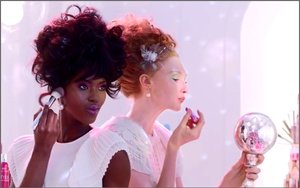
Ulta Beauty has once again blown most other retailers away with its quarterly results, posting second-quarter sales above expectations.
That news comes as further
evidence that beauty shoppers are more interested in niche and value brands, and less interested in department stores. As both JC Penney and Kohl’s look for new ways to lure the lipstick crowd,
it means much tougher times for high-end department store brands, like Estee Lauder.
At Ulta, based in Bolingbrook, Illinois, net sales soared 21.9% to $1.07 billion -- up from
$877 million in the same period of last year. That amounts to a 14.4% gain on a same-store basis. Sales were strong by every metric, including transactions and basket size, and sales in its
salons, which climbed 14.3%. E-commerce sales jumped 54.9%. And net income grew 21.3% to $90 million, compared to $74.2 million in the year-ago period.
advertisement
advertisement
The rise
of Ulta and category pioneer Sephora, owned by luxury heavyweight LVMH, continue to stick it to conventional department stores. Last week, Estee Lauder lowered its profit forecast, projecting
gloomier times in department stores. (Macy’s, which the Wall Street Journal says contributes 9% of Lauder’s revenues, just announced another round of store closures.)
Department stores have fought to hang on to beauty customers with mixed results. JC Penney, which has long used its Sephora stores to woo these women, has stepped up its expansion. In
remarks for its Analyst Day presentations last week, JC Penney executives describe it as “one of the biggest advantages over the competition,” giving the chain a 5% share of the prestige
cosmetics business. And it says it will be adding Clinique, one of Lauder’s biggest brands, in September.
Macy’s is hoping to court new beauty bucks with the acquisition
and expansion of Bluemercury. And in a report in the Dallas Morning News,
Kohl’s says it has completed the beauty departments in all 1,100 of its stores, a few years ahead of schedule in its long-term turnaround strategy.
Deutsche Bank analyst
Bill Schmitz, while still rating Lauder a buy, outlines some of the problems in his latest note: “While the industry is growing nicely overall, there are still looming questions around the cost
and ability of the company to capture the incremental growth, especially in the U.S.,” he writes, with niche brands gaining. “Over the last five years, five of the top eight prestige
beauty manufacturers in the U.S. have lost share … as the industry democratizes and more inclusive channels like eCommerce and specialty/multi formats take market share.”
Euromonitor says that in 2015, about 27% of all color cosmetics in the U.S. were sold at department stores. And while the Internet is a fast-growing channel, it still accounts for just 10%
of all U.S. cosmetic sales and 9% of fragrances.